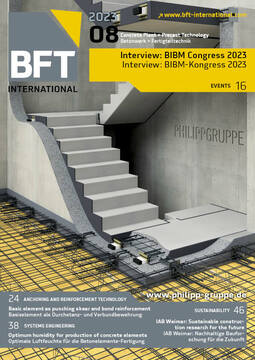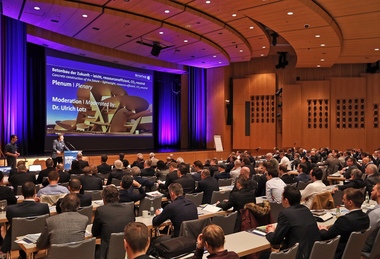BAU Congress China 2023
The important concurrent event of CADE Architectural Design Expo is jointly organized by Bauwelt and Messe München GmbH as well as its subsidiary in China, Zoomlion (Beijing) International Exhibition Co., Ltd.
Focusing on high-quality design, planning and construction, the annual BAU Congress China international building technology conference is an exchange and exhibition platform integrating innovative architectural ideas, high-quality architectural design, building materials and building technology for the rapidly developing Chinese market.
BAU Congress China will provide an international exchange of experience at a high level to find feasible solutions for the future of architecture in China. With product innovations and industry prospects, the congress is not only a reflection of the overall construction market but also provides a new way of thinking for China’s construction industry, which is currently facing many problems such as building quality, energy conservation, sustainable development and urban renewal.
Architecture and urban
planning in the 21st century
In the next 25 years, architecture and urban planning creating space for future generations to live and work in will change more dramatically than it has in the past one and a half centuries. The future of our built environment will look completely different from what we ever imagined. And it is going to differ greatly from what we are building today. Why is that? A completely different way of living and working, changes in mobility and the responsibility to prevent global warming will transform our behavior and, along with this, architecture and cities. Altogether, the shift in the way we live and work, demographic transition and climate challenges make us rethink the way we design our architectural future.
Topic 1: Urban design and public life
The corona crisis has made it clear that public life takes place predominantly in public spaces. Parks and streets have been celebrated as the places where society meets, exercises, and recreates. However, the idea of urbanity and the city as a shared space is challenged by uncontrolled growth, loss of pedestrian and historical structures. To embrace public life, urban design of tourist spots, local neighborhoods and infrastructure in metropolitan regions and megacities must consider parameters like inclusiveness, identity, and vitality. How can physical movement be made accessible to all citizens? Which new urban design strategies can foster more flexible neighborhoods? How can existing usage patterns inform urban design? The session presents exemplary public space and public architecture projects.
Topic 2: From high speed to high quality: Architecture for the 21st century
Since the 1980s, China has been undergoing an urbanization process at a speed that is unequaled in world history. Meanwhile, the country’s economy has entered a new era transforming from high-speed growth to high-quality development. Along with this, the consciousness for quality and durability in architecture shifts, too. Moreover, such individual, timeless designs keep and develop the existing historical contexts of our cities, supporting cultural distinctiveness and social cohesiveness.
Topic 3: Architecture for the people
Urban planning undertaken on a very large scale responds to the challenge of rapidly growing cities. But building at maximum height poses the risk of big dimensions dominating the city, forgetting the people who use the architecture. Collective projects on a human scale are rare. But today, a new attitude is growing in architecture. Buildings are downsized, barriers are dissolved, and locations for social meetings and affordable housing are built. Architects increasingly make use of regional materials such as tiles, rock, bamboo, timber and rammed earth. The innovative reinterpretation of traditional building structures responds to climate matters and resource scarcity. There are questions to be answered: How can a new, people-oriented architecture be embedded in the XXL-size city? Which small-scale qualities do buildings need to relate to people and ensure quality of life? What threatens or supports projects intended to serve the public good? The session will introduce a number of ground-breaking works using the human scale as a standard for architecture.
Topic 4: Architecture and
energy
China aims to achieve climate neutrality by 2060, the turning point in CO₂ emissions will be reached before 2030. The construction sector plays a central role in this goal. Buildings are responsible for more than a third of global energy consumption. Behavioral adjustments, technological advancement and design considerations can play important roles in reducing energy demand. Urban form, such as building density, also impacts energy efficiency. Renovating old buildings and urban spaces is a further ecological planning approach that can simultaneously contribute to memory preservation and community. Does the duration of architecture extend beyond the life of a built structure? How radically must architecture and urban planning change?
Topic 5: Smart public
buildings
In the 21st century, everyday objects, architecture and even entire cities start thinking themselves. Smart buildings promise comfort, convenience and resource conservation. They aim to maximize productivity and efficiency while providing a comfortable user environment. Not just private offices, but also public institutions like kindergartens, schools and hospitals increasingly integrate digital tools. This omnipresence raises the crucial question of the power of technology to create a better world. What are the possibilities and limitations of technology? Which are the challenges for realizing a smart building in terms of hardware and software, design and physical environment? How can digital technologies help to improve user experience?
CONTACT
Messe München GmbH
Messegelände
81823 München/Germany
+49 89 949-20720



